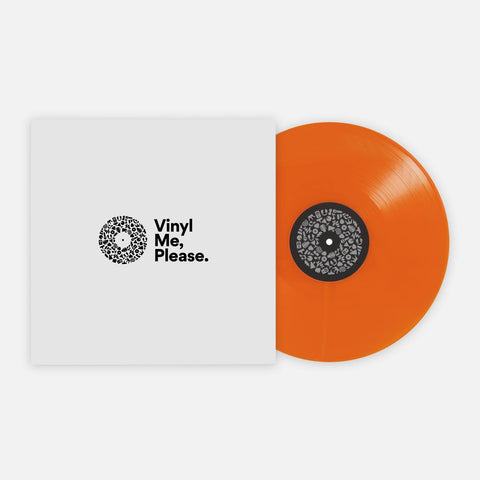Johnny Griffin's 'A Blowing Session'
Read The Liner Notes To Our New Release With Blue Note
Earlier this year, we released a reissue of Eddie Gale's Ghetto Music in partnership with Blue Note. Today, we're releasing the second release in our series with Blue Note: an exclusive edition of Johnny Griffin's A Blowing Session. To celebrate, we have the original liner notes, written by jazz critic legend Ira Gitler, excerpted below.
During the course of the liner notes for his first Blue Note album (BLP 1533), Johnny Griffin was quoted as saying that he preferred to "make it at home" (home being Chicago). Since the time of that LP's release, Johnny has changed his mind at the urging of Art Blakey and with his presence in the drummer's Messengers has swelled the group to sextet size.
When the augmented Messengers came to New York, it so happened that several other of the top small groups were also in town, either playing or laying off. Most of the musicians in these combos are friendly with each other and enjoy playing together. When someone like Johnny Griffin comes to town and causes much comment, the others are quite anxious to blow with him. What you hear here is exactly that... a blowing session, among the various leading lights of some of the East's important jazz organizations.
At the center of the session is the tenor sax triumvirate of Griffin, John Coltrane and Hank Mobley.
Mobley is the former Messenger star who is now doing his shining with The Horace Silver Quintet while Coltrane is the young man who rose to prominence in 1956 with the now disbanded Miles Davis Quintet.
The three have similar backgrounds in many ways. All of them have paid their dues in rhythm and blues bands. They also played with orchestras, Griffin with Lionel Hampton and Coltrane with Dizzy Gillespie. Trane also played with a Gillespie combo as did Mobley. Hank was with Max Roach before that and Griffin spent two fruitful weeks with Thelonious Monk in Chicago.
Despite the fact that they grew up musically in the same environment and have been influenced, in general, by some of the same musicians, the three tenors have very different conceptions, however forceful they may all be.
Griffin is more extrovert in a raucous manner and his rapid-fire delivery stamps him as one of "the fastest guns alive”. Mobley has a big, round edged sound and an even, logical conception. Coltrane is the most unconventional of the three with his vocal tone and very personal idea patterns. To add some brass bite to the session comes Lee Morgan, the extremely youthful trumpeter from the Dizzy Gillespie band.
Another member of the Gillespie organization who lends his ample talent in both solo and ensemble is pianist Wynton Kelly. Wynton, who has been with the Art Farmer-Gigi Gryce group and accompanist to Dinah Washington, is another of the many modern musicians who made their solo debuts on Blue Note. Here he offers several sparkling solos in the Bud Powell idiom and blends perfectly into the rhythm section sparked by Messenger chieftain Art Blakey and former Miles Davis bassist Paul Chambers.
Johnny opens a breakneck tempo version of Jerome Kern's “The Way You Look Tonight” with a chorus of melody before going into three febrile improvisatory cantos. Lee has two swift, brassy ones before Hank takes over for one quick chorus. Coltrane comes sailing in for two before Griffin and Art Blakey enter into a heated exchange that highlights each one's virtuosity. Johnny then carries the theme out with the rhythm section coming to the top for the bridge.
Coltrane has the first solo on “Ball Bearing” and makes the most of the intriguing harmonic pattern. Morgan follows In a wonderful groove as the rhythm section lays down a straight and wide carpet to walk on. Griffin then has two choruses that will awaken your senses and Mobley continues the excellent mood. All the tenormen are in fine form on this one. Kelly, who has the next solo spot is no less effective. After a short bit by Blakey, the last part of the theme is restated.
Another Jerome Kern evergreen, All The Things You Are, opens side two. Griffin carries the melody chorus again in a medium up setting. He then has three choruses of improvisation, reaching a peak in number three. Coltrane follow with his singular interpretation and Morgan's trumpet sings a couple before Mobley states his case clearly and emotionally. Kelly's chorus is a joy both rhythmically and melodically. Chambers then has his first solo of the session before Griffin and Blakey have a brief word or two and Johnny takes it out.
“Smoke Stack,” a blues, has an introduction by Kelly followed by its simple line and an immediate catapulting into action by Griffin who is both fast and funky. Morgan, cooking hotly, is next followed by eight choruses of Mobley and seven of Coltrane. Kelly has four before four by Chambers. Griffin and Blakey then converse tersely and the theme is riffed to completion.
Join the Club!
Join Now, Starting at $36Pages




